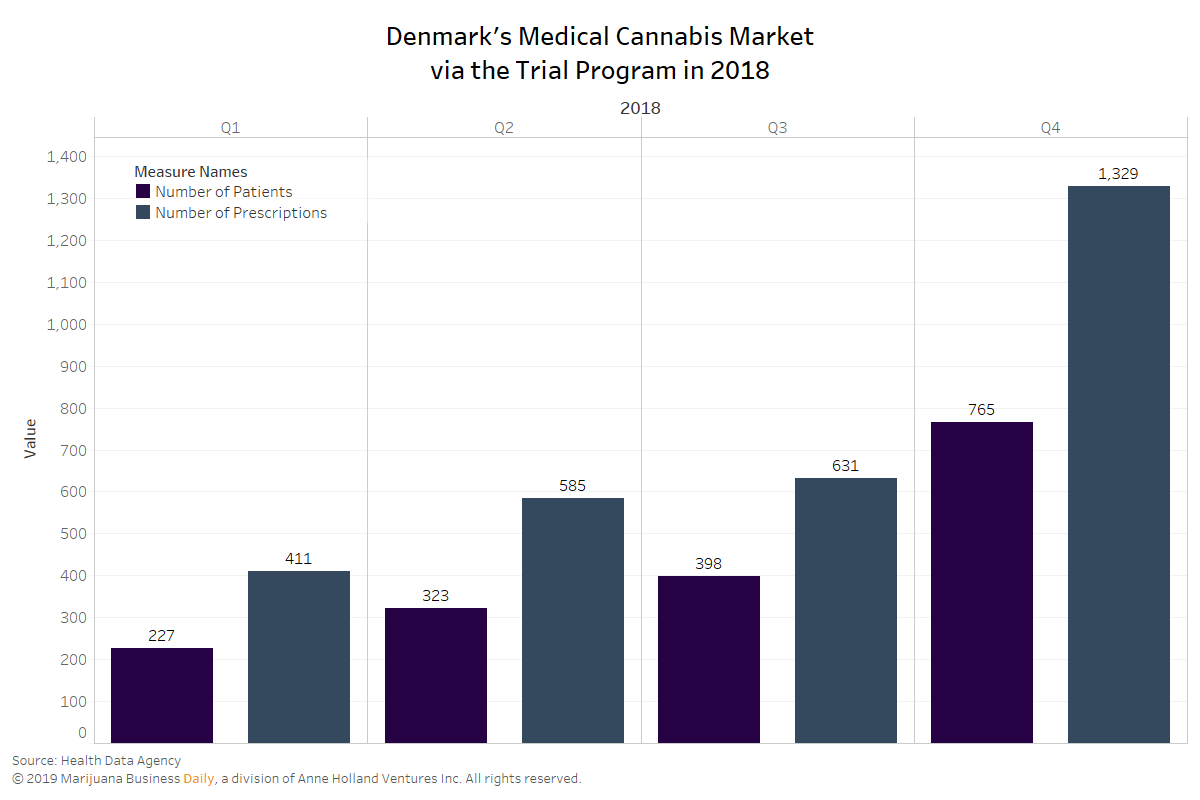With Europe fast becoming a cornerstone in the global medical marijuana industry, business leaders from dozens of countries descended on Copenhagen, Denmark, to discuss emerging opportunities in the burgeoning market.
Capital markets, partnerships and more were on the docket Monday at Marijuana Business Daily’s inaugural European Cannabis Symposium in Denmark, one of the countries leading the medical marijuana charge.
Denmark’s supportive regulations have helped the country attract hundreds of millions of dollars in foreign direct investment from global leaders such as Canadian giants Canopy Growth and Aurora Cannabis, among others.
Here are some of the key business takeaways from medical cannabis leaders at the symposium:
Denmark can open doors.
Denmark is supportive of medical cannabis patients and businesses across party lines. That was a key message for businesses from the keynote session featuring Denmark Health Minister Ellen Trane Norby.
“Denmark is the right country to do business in medical cannabis, because we have a supportive country in rules and regulations,” said Rikke Jakobsen, CEO of Cannabis Denmark, a nongovernmental organization.
“Even though the regulations are strict, they’re stable and consistent.”
Don’t ignore countries that are developing domestic supply.
Germany’s bid to cultivate MMJ – which has been in the works for more than a year – will produce only 10%-20% of the domestic German market.
“That’s important because always in these tenders (in places like Germany), there’s a few strains, whereas in Canada you need 30 to 40 strains to service all the different patient groups,” said Hendrik Knopp, managing director of Aphria Deutschland.
“That’s why we focus on in-country cultivation and imports. There will always be demand for imports – it’s twofold.
“In a closed-shop (system), you have the problem that the regulating authority does not know what strains (and quantity) will be demanded in two to three years. The German tender is for four years and is fixed, so every year it is the same amount. So, patient demand grows, and supply is flat.”
Understand the supply chain.
The biggest takeaway from product quality and supply-chain management is being able to eliminate any issues with regulators by understanding your entire supply chain, including your manufacturers’ supply chain.
How?
“By looking at and owning the entire supply chain,” said Arnaud Dumas de Rauly, co-founder and co-CEO of New York-based The Blinc Group.
“So, not only the manufacturers but their suppliers, who are able to provide products that are 100% straightforward. Ask those questions: Where do you get this vape device? Where does the manufacturer get its suppliers? That applies across the board, because this is one of the biggest hurdles going forward.”
Make sure you understand the standards.
Good Manufacturing Practice (GMP) is simply a system for ensuring consistently produced product.
That was a key takeaway for Karina Lahnakoski, vice president of quality and regulatory at Vancouver, British Columbia-based Cannabis Compliance.
Quality is built in, not tested at the end of the process – and EU-GMP is the most vigorous in the world.
GMP generally starts at drying but depends on your product and whether it is considered an active pharmaceutical ingredient (API) or a finished product.
This can be confusing in Germany with how products are handled at the pharmacy level, Lahnakoski said.
There’s also a challenge for the Canadian system, which is regulated to Good Production Practices – which is not the same as the pharmaceutical standard.
Why are there so few companies with EU-GMP certification? It includes a heavy requirement for skills and people – and quality is the license to operate.
Don’t be discouraged by slow regulation and development.
Europe’s crackdown on CBD food products is happening – and it’s going to take years before cannabinoid manufacturers have any certainty about adding them to foods and drinks anywhere in Europe, according to Tomas Sadliek, director of government affairs for the International Cannabis and Cannabinoids Institute.
Sadliek told cannabis entrepreneurs that Europe’s slow approach to CBD could be better for business opportunities in the long run, even if profits are delayed.
“I’m a big fan of small steps that are secure and irreversible, rather than revolutions that can be changed in the next election,” he said.
Standardization is needed in Europe.
Making a quality product is a challenge, but it’s required in order to have API that is always the same, said Tjalling Erkelens, founder and CEO of Bedrocan.
Genetic conditions and manufacturing environment have to be controlled/standardized for pharmaceutical-grade production.
Regulatory matters are not harmonized across Europe, and it is difficult for industry to get to a sustainable industry while taking care of patients.
“We have to get better at taking care of patients; there is still a lot of work to do,” Lahnakoski said.
Matt Lamers can be reached at mattl@mjbizdaily.com




